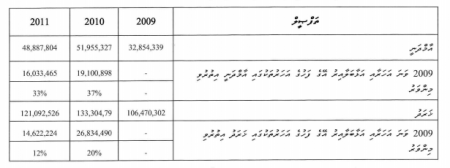The Criminal Court has asked the Prosecutor General’s Office (PG) to resend all files concerning Supreme Court Justice Ali Hameed’s alleged misuse of state funds after case documents were destroyed in a coffee spill.
The PG has asked the Criminal Court to present the damaged documents three weeks ago, but the court has not done so yet, an official from the PGO told Minivan News.
The state is raising corruption charges against Ali Hameed over the illegal transfer of credit from his state-funded mobile phone in 2010.
An official from the Criminal Court told Minivan News on April 13 that the court had not decided to accept the case or not.
Cases filed by the PG office are scrutinised in the order of submission “to make sure all the paperwork is complete and that there are no missing documents,” he said. The process normally takes “two to three days,” he added.
The case against Justice Hameed – accused of abuse of authority to benefit a third party – was sent to the PG office in July 2013 by the Anti-Corruption Commission (ACC) after investigating allegations in the 2010 audit report of the Department of Judicial Administration.
Auditors found that a Supreme Court Justice transferred MVR2,223 (US$144) from his state-funded mobile phone on different occasions during 2010.
According to the audit report, the interim Supreme Court bench on October 23, 2008 decided to provide for each justice “a post-paid line, a phone and to pay the phone bill without a set limit out of the court’s budget”.
The report also noted that between October 2008 and December 2011, Supreme Court judges paid their phone bills amounting to MVR 281,519 (US$18,257) from the state budget, despite the fact that parliament had not allocated any phone allowances to the judges. Additionally, MVR 117, 832 (US$7640) was found to have been overspent on wages and allowances to the driver of a judge’s car.
The judge is also currently subject to investigation over his alleged appearance in multiple leaked sex videos depicting him fornicating with foreign women in what appears to be a Colombo hotel room.
A further video also appears to show Hameed and a local businessman, Mohamed Saeed, discussing political influence in the judiciary.
Justice Hameed in the video reveals his political ‘hook-up’ with President Abdulla Yameen, claiming that he was one of Yameen’s “back-ups” and that his stand was “to do things the way Yameen wants”, promising to “kill off” Dhivehi Rayithunge Party (DRP) leader Ahmed Thasmeen Ali “if it comes into my hands.”
Even [Speaker of Parliament] Abdulla Shahid will know very well that my stand is to do things the way Yameen wants. That the fall of this government was brought with our participation,” he adds.
However, he also claims that he was a person who “even Yameen cannot play with” and that over time he had “shown Yameen” who he is.
After the sex tapes of Hameed surfaced in May 2013, the judicial oversight body, Judicial Services Commission (JSC), set up committees to investigate the case twice – in May and December 2013.
Both subcommittees unanimously recommended the JSC suspend Hameed pending an investigation.
However, in July 2013, the JSC disregarded the recommendation citing lack of evidence, while a JSC decision on the December subcommittee’s recommendation is still pending.
